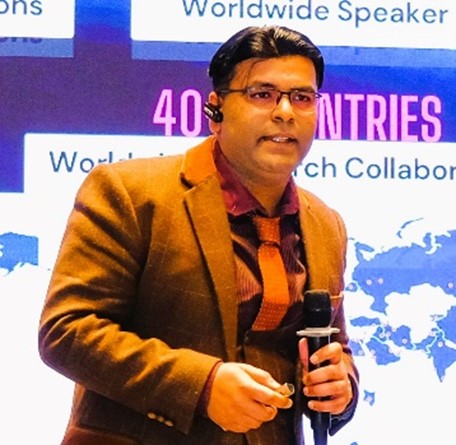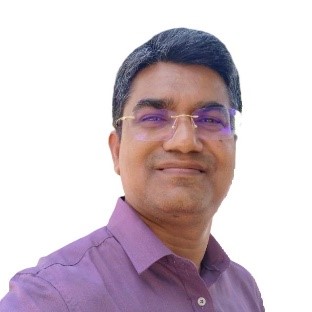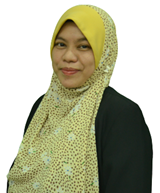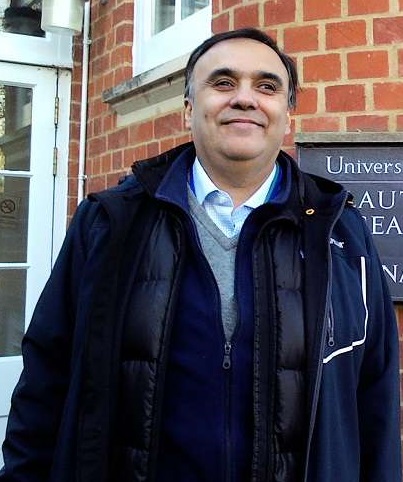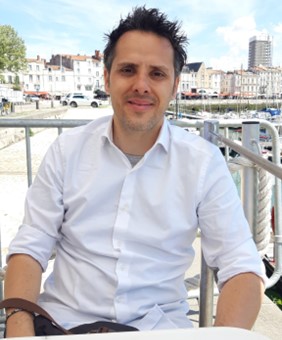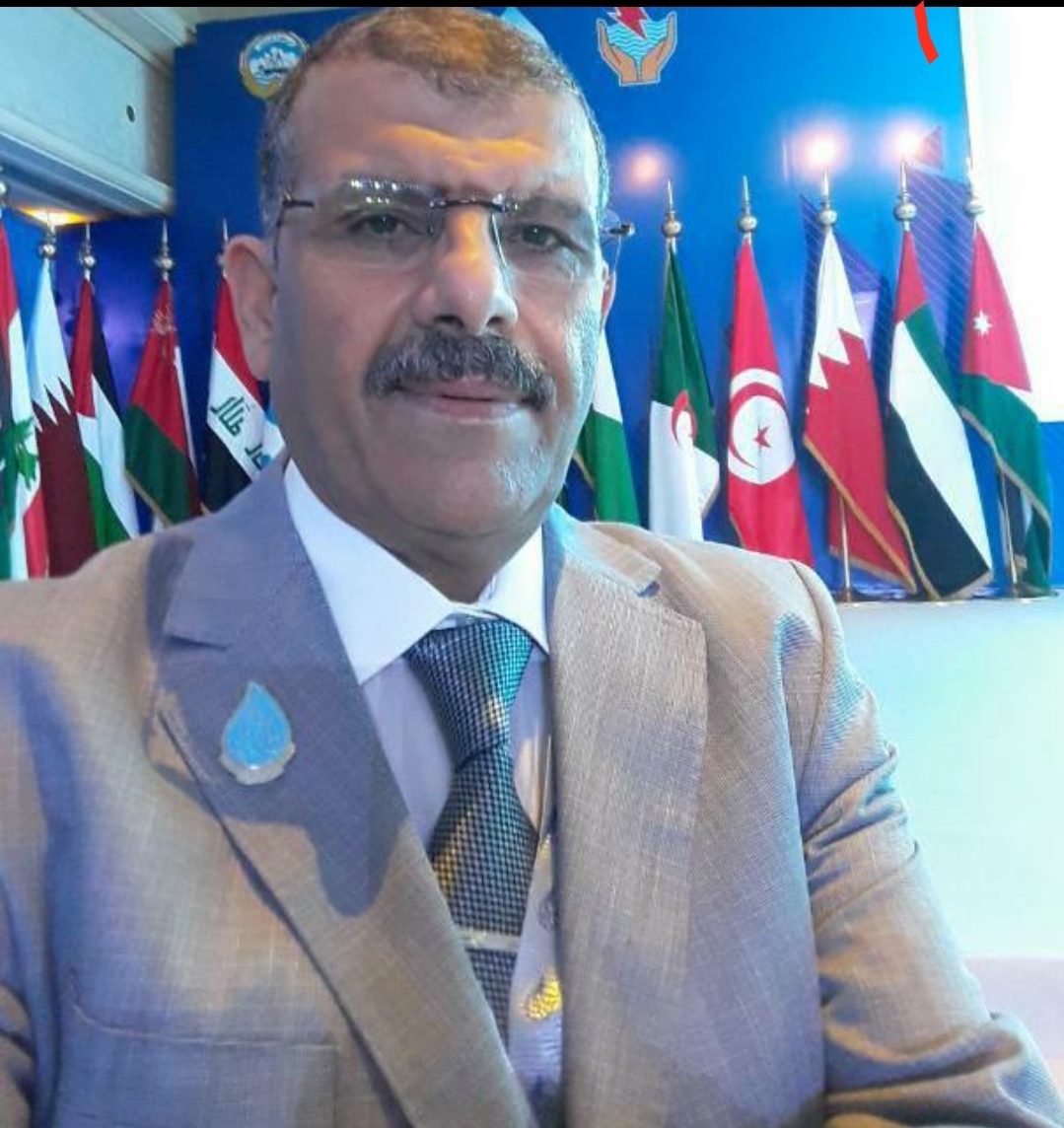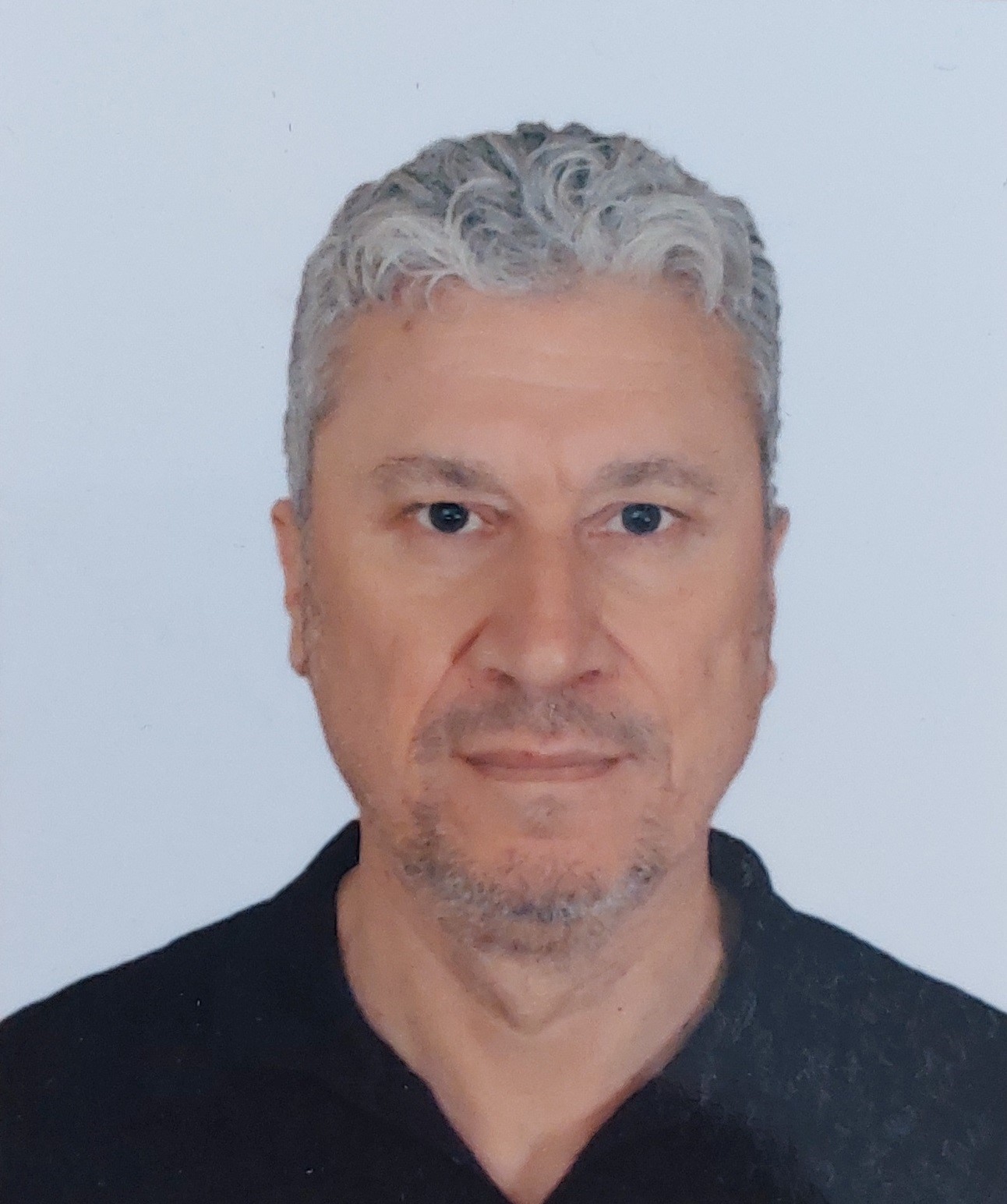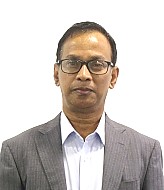Keynote Speaker I
Professor. Dr. Saim Memon |
Speech Title: Unchaining Net Zero Energy Building Infrastructure: The Role of Vacuum Insulated Materials in Achieving Sustainable Development Goals and Combatting Climate Change Through Energy Efficiency Abstract: Vacuum insulated energy materials for energy savings such as vacuum insulated wallpaper (VIW), vacuum insulation panel (VIP and decorative integrated VIP are pivotal industrial R&D developments that help in achieving net-zero energy buildings due to their superior thermal efficiency and space-saving attributes. These vacuum insulated materials significantly reduce heat transfer, thereby lowering the energy needed for heating and cooling, aligning with sustainability goals by reducing buildings' carbon footprints. VIW and VIP are particularly effective in extreme climates, offering superior insulation with minimal thickness compared to traditional materials like XPS, EPS, mineral wool, or polyurethane. This results in less space required and lower overall energy consumption. In both cold-arid regions where heating is essential, and hot-arid areas where cooling demands are high, VIPs effectively prevent unwanted heat transfer, enhancing interior comfort while reducing energy use and associated carbon emissions. Overall, the application of VIPs in buildings not only supports stringent building regulations but also contributes to a sustainable, energy-efficient future. This keynote speech focus on addressing global challenges to pave the way for a sustainable, net-zero energy future using vacuum insulation energy technologies. Biography: Professor. Dr. Saim Memon, CEO and Industrial Professor of Renewable Energy Engineering, unifies academic research, industrial manufacturing, and global product distribution. A Chartered Engineer and Fellow of the Higher Education Academy, he holds Qualified Teacher Status from the General Teaching Council for Scotland. Prof. Memon boasts multidisciplinary expertise in Electrical, Mechanical, and Renewable Energy Engineering, with over 120 research publications and 50+ speakerships, engaged in research with 40+ countries worldwide. He taught 41 modules, supervised numerous PhD and MSc/MEng projects, and collaborated with researchers in 40+ countries. His work has acquired 1600+ citations, a 23+ h-index, and a 52+ i10-index. His specific research experiences encompass net-zero energy buildings, vacuum insulation, thermal management of electric vehicle batteries, translucent vacuum insulation panels, energy materials for vacuum insulated smart windows, , vacuum-based photovoltaic solar thermal collectors, applied semi-transparent photovoltaics and switchable films, renewable energy technologies, thermoelectric devices for energy harvesting and smart grid integration into electric vehicles with fast-charging battery mechanisms. |
Keynote Speaker II |
Associate Professor Ts. Dr. Md. Munir Hayet Khan |
Speech Title: Applications of Drones and Machine Learning Methods in Groundwater Research Abstract:The integration of drone technology and machine learning methods has revolutionized groundwater research, providing innovative solutions for monitoring, analyzing, and managing groundwater resources. This speech explores the applications of drones equipped with advanced sensors for real-time data collection and the use of machine learning algorithms to process and interpret this data. By leveraging high-resolution aerial imagery and remote sensing capabilities, drones can identify groundwater recharge areas, map groundwater quality, and detect contamination sources. Machine learning techniques, such as neural networks and decision trees, enhance the accuracy of groundwater models, predicting trends and identifying potential risks. This talk presents case studies and practical examples demonstrating the effectiveness of these technologies in various geographical settings, highlighting their potential to improve groundwater sustainability and inform policy decisions. The findings underscore the importance of adopting technology-based solutions to address the critical challenges of groundwater management in the face of climate change and increasing human demand.. Biography: Dr. Md. Munir Hayet Khan is an esteemed Associate Professor at INTI International University, Nilai, Malaysia, where he has been a pivotal figure since 2013. With over two decades of extensive experience in civil and environmental engineering, Dr. Munir has established himself as a proactive academician, researcher and Environmental Impact Assessment (EIA) consultant. Dr. Munir's academic journey began with a Bachelor's degree in Civil Engineering from Khulna University of Engineering & Technology (KUET), Bangladesh, followed by a Master's degree in Environmental Engineering from Universiti Putra Malaysia (UPM), where he graduated with a stellar CGPA of 3.87 out of 4.00. He completed his PhD in Civil & Structural Engineering from Universiti Kebangsaan Malaysia (UKM) in 2019. Dr. Munir's teaching repertoire spans a wide array of subjects including Environmental Engineering, Water Engineering, Engineering Hydrology, Soil Mechanics & Geotechnical Engineering, and Project Management. His dedication to education extends beyond the classroom as he has supervised numerous final year projects and postgraduate theses, contributing significantly to the academic growth of his students. As a researcher, Dr. Munir has an impressive portfolio of publications in high-impact journals. His work on machine learning models for drought and groundwater level forecasting, spatiotemporal changes in precipitation, and the environmental impact of offshore decommissioning of oil and gas pipelines is widely recognized. He has also been invited as a keynote speaker at international conferences and universities, underscoring his reputation as a thought leader in civil and environmental engineering. Dr. Munir's commitment to advancing the field of engineering through education, research, and consultancy makes him a distinguished figure in the academic and professional communities. |
Keynote Speaker III |
Prof. Ir. Ts. Dr Sharifah Rafidah Wan Alwi |
Speech Title: Climate Resilience of Renewable Energy Systems: Risk Assessment and Mitigation Strategies Abstract: The growing frequency and intensity of extreme weather events globally pose significant risks to energy security. This presentation explores the impact of climate change on renewable energy systems, focusing on risk assessment and mitigation strategies. A comprehensive framework is developed using both qualitative and quantitative methods to evaluate the effects of extreme temperatures and precipitation on solar, hydropower, and biomass energy systems. Climate susceptibility maps are utilized to identify regions most at risk from floods, droughts, and heatwaves. Projections indicate that by 2050, increased rainfall variability, higher temperatures, and more frequent droughts will pose significant challenges. Solar and hydropower systems face moderate risks, while biomass systems are particularly vulnerable. These conditions could impair performance, damage infrastructure, and raise costs. The importance of diversifying energy sources to enhance resilience is emphasized. By examining government initiatives to expand renewable energy and reduce carbon emissions, the challenges posed by unpredictable weather patterns are highlighted. This presentation underscores the critical need for robust climate risk assessment in the planning and development of resilient energy systems. Biography: Prof Ir Ts Dr Sharifah Rafidah Wan Alwi is a Research Fellow of Process Systems Engineering Centre (UTM-PROSPECT), and Professor in Faculty of Chemical and Energy Engineering in Universiti Teknologi Malaysia (UTM). She previously helmed as the Director of UTM-PROSPECT for ten years (2011 to 2021). She is an expert resource minimisation consultant for multiple industries and is among the leading researchers in resource integration technique development. Prof Sharifah is the co-founder and Director of Optimal Systems Engineering Sdn Bhd, a UTM Spin-off company. She has been extensively involved in 10 commercialised products, 80 research projects, 17 industrial based projects and has trained engineers from more than 300 companies in the field of sustainable engineering design and management. Sharifah has won more than 50 international and national awards such as ASEAN Young Scientist and Technologist Award 2014, National Young Scientist Award 2015, ASEAN-US Science Prize for Women 2016, Malaysia Research Star Award 2016, 2018, 2019, Top Research Scientists Malaysia 2018, ‘8 Women Scientists from Asia You Should Know’ in 2021 by AsianScientist.com and World Top 2% Scientist 2022 (Single Year and Career Long). Sharifah is also the Associate Editor for Journal of Cleaner Production and UTM Sustainable Energy Management System advisor. She has served as the Chair for the Science Leadership Working Group under Young Scientist Network, Academy of Sciences Malaysia (YSN-ASM) and Malaysia IChemE Young Engineer Group (YEG). Sharifah is also a certified energy manager, a registered electrical energy manager, a certified trainer for ASEAN energy managers and Fellow of Academy of Sciences Malaysia. |
Keynote Speaker IV |
Assoc. Prof. Ir. Dr. Norazwina Binti Zainol |
Speech Title: The Future of Ocean Energy: Innovations in Bioenergy from Marine Algae and Biomass Abstract:The search for sustainable and efficient energy solutions has turned the world's attention to the vast potential of ocean resources. This presentation examines the future of ocean energy, focusing on innovative technologies for bioenergy production from marine algae and biomass. The latest advancements in bioprocessing techniques, which harness the power of these oceanic resources to create clean, renewable energy will be explored. Through an integrated framework that includes both experimental and computational models, we evaluate the efficiency, scalability, and environmental impact of these technologies. Marine algae and biomass offer unique advantages, including high growth rates and minimal competition for land, making them ideal candidates for large-scale energy production. Projections indicate that by 2050, the adoption of ocean-based bioenergy could significantly reduce carbon emissions, providing a viable alternative to traditional fossil fuels. The discussion will also address the challenges in the widespread implementation of these technologies, including the need for supportive policy frameworks and infrastructure development. By emphasizing the role of bioenergy from marine algae and biomass in the broader context of ocean energy, this presentation highlights the potential for a sustainable and resilient energy future. Biography: Assoc. Prof. Ir. Dr. Norazwina Binti Zainol is an esteemed academic and researcher at the Faculty of Chemical and Process Engineering Technology, Universiti Malaysia Pahang. With a Ph.D. in Chemical Engineering from the National University of Malaysia, she brings over 25 years of expertise in environmental biotechnology, waste treatment, and process optimization. Dr. Norazwina is a member of the Institution of Engineers Malaysia and a Professional Engineer with a Practising Certificate from the Board of Engineers Malaysia. Dr. Norazwina has led numerous national and industrial research projects focused on waste-to-energy processes and the development of sustainable waste management systems. Her work includes optimizing microbial fuel cells and advancing bioprocesses for converting agricultural and industrial waste into renewable energy sources. With over 70 publications in high-impact, Scopus-indexed journals, conference proceedings, and book chapters, Dr. Norazwina’s research on biogas production, purification, and the utilization of microalgae in wastewater treatment has gained wide recognition. Her publications have been extensively cited, reflecting her influence and expertise in the field. As an experienced researcher and speaker, Dr. Norazwina offers valuable insights into using biotechnology to create renewable energy sources, making her a key expert in the field of renewable energy. |
Keynote Speaker V |
Assoc. Prof. Dr. Sergio Pena-Neira |
Speech Title: International public policies on ocean renewable: Effects of the advisory opinion of the International Law of the Sea Tribunal on climate change (and other cases) vis a vis ocean renwables Abstract: The recent advisory opinion titled 'Request for an Advisory Opinion Submitted by the Commission of Small Island States on Climate Change and International Law' marks a significant milestone in the fields of international relations, public policy, and international law. Ocean renewable energy is pivotal in crafting a comprehensive strategy to combat climate change, underscoring the need to thoughtfully consider innovative technologies in this area. Each sovereign state must develop its own policy approach, balancing maritime rights, the needs of its population, and a careful assessment of the environmental impacts on its natural resources. This analysis will explore the implications of this landmark advisory opinion on ocean renewables, particularly in the context of other international judgments and advisory opinions that shape global public policies on renewable energy. Ocean renewable energy is essential for an effective response to climate change, emphasizing the importance of integrating advanced technologies and environmental considerations into policy-making processes. |
Keynote Speaker VI |
Prof. Dr. Eng. Enrico Zacchei |
Speech Title: Influence of Climatic Actions on the Dynamic and Static Response of Insulating Glass Units Abstract: Insulating glass units (IGUs) are composed by glass plates held together by structural edge seals, entrapping a gas for thermal/acoustic insulation, and energy saving, filling a cavity sealed by perimeter spacers. The most of literature research treated this kind of composite structure without considering the real influence of the internal gas, which can undergo density variations due to climatic actions, temperature changes and more in general climate change. In many cases IGUs are also used by combining with photovoltaic panels. In this presentation, accurate analytical/numerical analyses and experimental laboratory tests have been carried out to quantify the static and dynamic behaviour of IGUs, as a function of the glass and cavity thickness, glass size, temperature variations, gas density variation, gas type, etc. Some scenarios and benchmark examples have been analysed. Results of dynamic analyses show that the gas presence can produce a system frequency greater of ~5.0 than the fundamental frequency of the glass. More significant effects were noted for higher vibration modes. Results show that, due to daily variations of solar radiation and environmental temperature, the gas is subjected to temperature variations in the range about ± 15.0 °C, leading to variation of the gas density between -5.0% and +7.0%, considerably affecting the frequency response of IGUs. Biography: Visiting Professor at Department of Civil Engineering of the University State of São Paulo (UNESP), Brazil. Postdoc at Institute of Mechanics, Materials and Civil Engineering (IMMC) of the Catholic University of Louvain (UCL), Belgium, in Structures. PhD from University of Salamanca (USAL), Spain, in co-tutorship with the Polytechnic School of the University of São Paulo (USP), Brazil. Second PhD from University State of São Paulo (UNESP), Brazil, in Structures. Master and Bachelor degree in Civil Engineering - Structures, from University of Roma Tre (Uniroma 3), Italy. 10 extension courses at USP and UNESP University. |
Keynote Speaker VII |
| Prof. Anupam Khajuria |
Speech Title:Circular Economy Strategies for Reducing Marine Pollution: Implications for Climate Change and Ocean Renewable Energy Abstract: The speech will focus on how adopting circular economy strategies in coastal and marine industries can help reduce pollution, protect marine ecosystems, and enhance the sustainability of ocean renewable energy. It will highlight the interconnections between reducing marine plastic pollution, climate change, and the sustainable development of ocean-based renewable energy. Biography: Dr. Anupam Khajuria is a Research Fellow and Academic Associate with the Innovation and Education Programme at UNU-IAS. Prior to joining UNU-IAS, Dr. Khajuria worked as a researcher at the United Nations Centre for Regional Development (UNCRD)-DSDG/UN DESA in Nagoya, Japan, for almost 10 years, she also coordinated several training programs, forums, conferences and seminars with national and international governmental organizations. Dr. Khajuria has extensive knowledge and experience in conducting environmental research projects, and has published a number of research articles in peer-reviewed international journals in the environmental sciences domain, with a focus on waste and water engineering, circular economy and sustainable development |
Keynote Speaker VIII |
|
Dr. Yousry El Sayed Mattar |
Speech Title: Changes In the Precipitation Patterns as a Climate Change Indicator in the Kingdom of Saudi Arabia Abstract: TBA Biography: TBA
|
Keynote Speaker IX |
Prof. Dr. Bilal Acar |
Speech Title: Solutions for Mitigating Adverse Effects of Climate Change on Crop Production in Water Shortage Environments: An Example of Semi-Arid Konya Closed Basin of Türkiye Abstract: Agro-production relies on mainly environmental conditions and climate change has huge impacts on agriculture particularly water scant areas. Türkiye, among high-risk countries affected from climate change, is situated at eastern part of Mediterranean region of world. In this work, impacts of agricultural drought on agro-production of Konya Closed Basin (KCB) were assessed comprehensively and some practical solutions for productive use water resources in agriculture were discussed. In result, water scarcity, becoming an increasingly serious problem in this basin day by day, has huge impacts on agricultural activities. Unconscious irrigation practices have resulted reductions in water levels. Overwater use, due to the expansion of cropped lands with high water consumption, from groundwater reservoir has caused sinkholes in some part of KCB such as in Karapınar province. Water use in irrigation processes is almost 75% in Konya plain and due to the severe agricultural drought in basin at recent years, it is impossible for famers to obtain economical income from agricultural activities without irrigation even for winter cereals. Development of drought-resistant plant species and widening of their cultivation is one of the important solutions for mitigating adverse effects of drought on water resources as well as on crop production. In addition, reducing planting areas with high water consuming crops such as corn or in the other word increasing the planting area of less water consuming crops is viable solution for sustainable Agricultural water management in semi-arid KCB. Deficit irrigation is another strategy for achievement water productivity with application of unit water especially in water shortage ecologies. As a result, climate change is reality and agro-production program must be done by considering current water resources particularly in water-starved areas. Biography: Acar Bilal, is currently as a Professor at Department of Farm Buildings & Irrigation, Faculty of Agriculture, University of Selçuk, Konya, Türkiye. He has around more than 21 years of teaching and research experiences in Irrigation Science, Irrigation System Designs, Water Resources Management, Irrigation Program and Agricultural Water Management particularly in water shortage regions. He has published more than 95 papers and conference proceedings, and completed several projects relevant to water resources management or water productivity and water-yield relationships under different irrigation regimes. He has produced some of his publications in well-known journals with high impact factor such as Irrigation Science, Agricultural Water Management, Energy, and Horticulture, Environment and Biotechnology. He is currently an International Editorial Review Board of the International Journal of Agriculture and Economic Development (IJAED). |
Keynote Speaker X |
Prof. Dr. M A Hannan |
Speech Title: Power Electronic Contributions in Renewable Energy Conversion toward Reducing Global Warming Abstract: Global energy consumption is increasing at a dramatic rate and most of the energy comes from fossil fuels which cause the problem of global warming due to the emission of greenhouse gases. Climate change and the global warming challenges turn up to be like a major threat to the world. Accordingly, the world is going through a crucial energy problem to supply efficient and cost-effective energy to face the rapid rise of energy need and increasing negative environmental impacts. Therefore, new guidelines and technological innovation are necessary to ensure energy security without causing emissions. Power electronics technology offers high reliability, efficiency and has been successfully implemented in different applications to convert renewable energy, conserve energy, improve performance efficiency and mitigate global emissions. This keynote focuses on various aspects of power electronics technologies in converting energy from conventional form to a sustainable form which in turn solves the existing global warming problem. The different topologies of power electronics converters are explained on the basis of types, control difficulties, benefits, and drawbacks. Different categories of power electronics controllers utilized for energy conversion are comprehensively reviewed on their structure, algorithm, and mathematical model, strength, and weakness. Furthermore, the keynote emphasizes the execution of power converters and controllers in different applications and highlights their contribution to save energy and mitigate emissions. All the highlighted insights of this keynote will hopefully lead to increasing efforts towards the development of the advanced power electronics converters and controllers for efficient energy conversion which in turn can reducing of global warming. Biography: M A Hannan is employed as Distinguished Professor & Professor of Intelligent Systems in Energy and Power Applications in the School of Engineering and Technology, Sunway University, Malaysia. He is an Adjunct Professor at School of Electrical Engineering, Korea University, Korea and Visiting Professor at Universiti Tenaga Nasional, Malaysia. He was a Visiting Professor at School of Electrical, Computer and Telecommunication Engineering University of Wollongong, Australia. Prior to join Sunway University, Prof Hannan was with College of Engineering, The National Energy University, Malaysia as a Senior Professor and Advisor for research and publication in Innovation and Research Management Centre, UNITEN since Sept 2016 to May 2023. He was also with the Faculty of Engineering and Built Environment, National University of Malaysia as a full Professor before joining to UNITEN since 2013. His research interest is on intelligent systems in energy and power applications related to renewables integration, energy storage system, hydrogen storage, smart grid, energy management system, building energy efficiency, battery controller and BEMS, HEV energy management system, inverter controller, MPPT, FACTS and custom power devices, power quality and intelligent embedded system development in academic and industrial (national and international) level of research and development. |
